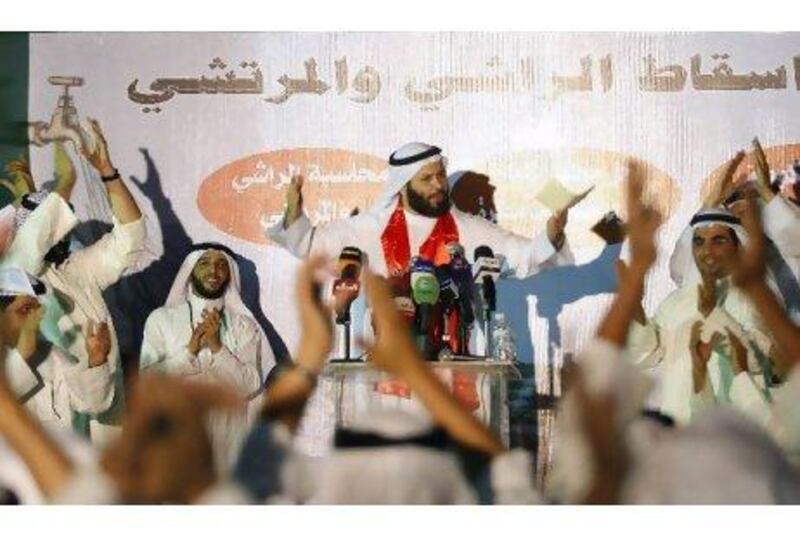KUWAIT CITY // Allegations that multi-billion dinar deposits have been paid into the accounts of several parliamentarians have led to a surge in support for Kuwait's simmering anti-government protests.
The corruption accusations mean the National Assembly could be heading into another political crisis as soon as its summer recess ends next month.
"If the government doesn't do something about this, it's just going to get worse," said Anwar Al Azmi, an official for Kuwait Workers' Union, at a demonstration attended by 3,000 citizens in front of parliament on Wednesday night. "We want to know where all this cash is coming from."
Mr Al Azmi speculated: "The source of this money is either from bribes by foreigners or by the government itself."
The gathering on Wednesday - the second within a week - was supported by more than a dozen members of parliament. A heavy security presence stood back as the politicians demanded the resignation of the prime minister, a new election and the results of an investigation into the corruption scandal.
Faisal Al Muslim, an Islamist opposition MP, told the crowd that he will question the prime minister, Sheikh Nasser Mohammed Al Sabah, about the payments in parliament. The firebrand shouted to the crowd: "The people want Nasser Mohammed to go!"
Political parties are illegal in Kuwait, so the parliament consists of independents, members of tribes and Islamist and liberal "groups". No faction controls more than a handful of the chamber's 50 seats.
The government needs the backing of the fractious parliament to pass legislation. News of the alleged payments has led many Kuwaitis to wonder if some members of the chamber are selling their loyalty to the highest paying royal.
Local press reports have indicated that the central bank has launched an investigation into nine MPs' bank accounts after National Bank of Kuwait and Kuwait Finance House reported suspicious transactions to the public prosecution. Other local banks are said to be reviewing suspicious transactions.
Ahmed Al Sadoun, an MP, has estimated the value of money involved is about 96 million Kuwaiti dinars (Dh1.27 billion).
Opposition MPs, led by Sunni Islamists and tribesmen, have been calling for the prime minister to be replaced long before the start of the Arab Spring protests. They accuse Sheikh Nasser, who has headed seven cabinets since 2006, of corruption and the failure to implement a multibillion dollar investment plan.
In a sign that the opposition could be gaining support in the wake of the scandal, two members of parliament who often vote in favour of the government, Saleh Al Mulla, a liberal, and Hassan Johar, a Shiite, joined the anti-corruption demonstration.
"This is the first time in a long time that liberals and conservatives have been involved in a protest: it's a very strong message," said Abdullah Al Ahmed, a youth member of the National Democratic Alliance, a liberal political group. "Before, we thought the parliament might have worked, but not any more. This is a crisis of the democratic system in Kuwait."
Kuwait has slipped from 35th position in 2003 to 54th in 2010 in the Corruption Perceptions Index of Transparency International, a global organisation that tries to fight corruption. The result makes Kuwait the lowest ranked of the six member states of the Gulf Cooperation Council, which is led by Qatar in 19th position.
Shamlan Alessa, a political scientist at Kuwait University, said paying bribes for the support of parliamentarians is "very old", but now "the price of buying loyalty has increased because members of the royal family are fighting among themselves".
"It's a sad story - it's very dangerous," Mr Alessa said. He believes bribery in Kuwait goes much further than a few cash deposits into bank accounts. It includes contracts within the oil and construction industries and handouts of land. "That's why people are very frustrated," he said.
Despite the street protests, Mr Alessa believes the government will hold its majority in the National Assembly. He said that the emir is "more likely" to reappoint the cabinet than dissolve the parliament and call for a fresh election.
"There will be a big storm, and then it will be quiet," Mr Alessa predicted.





